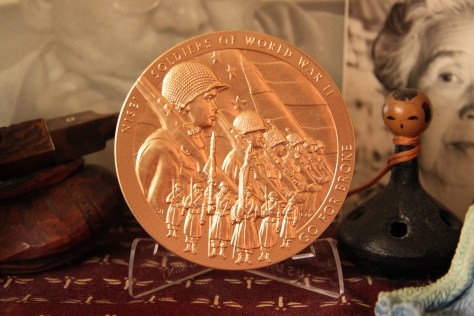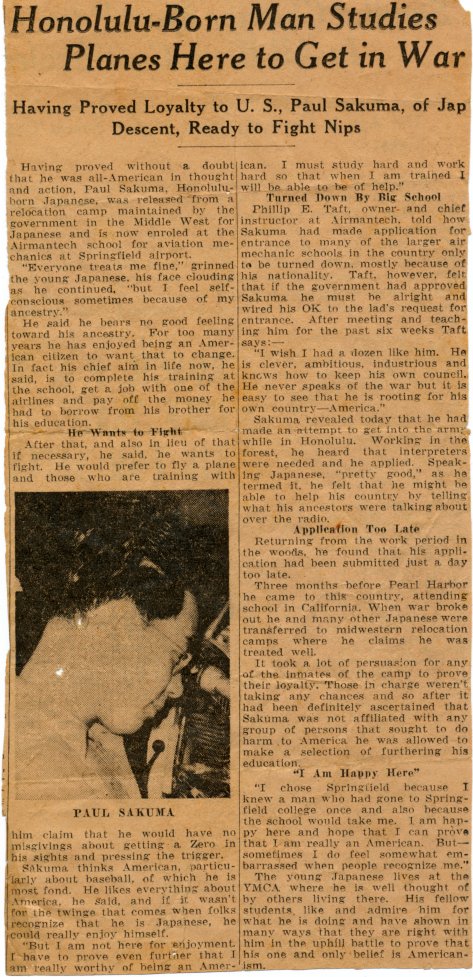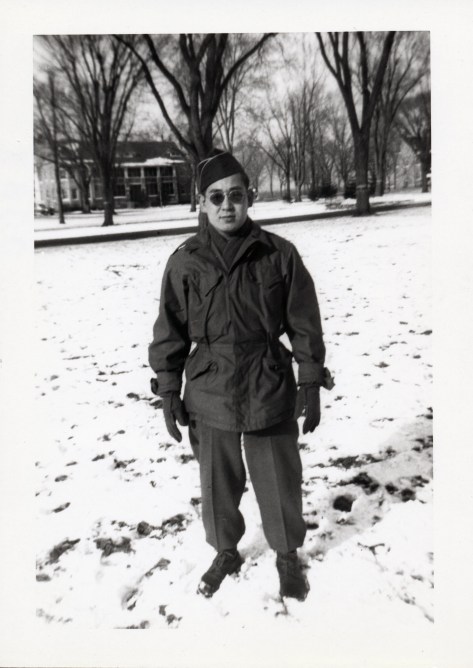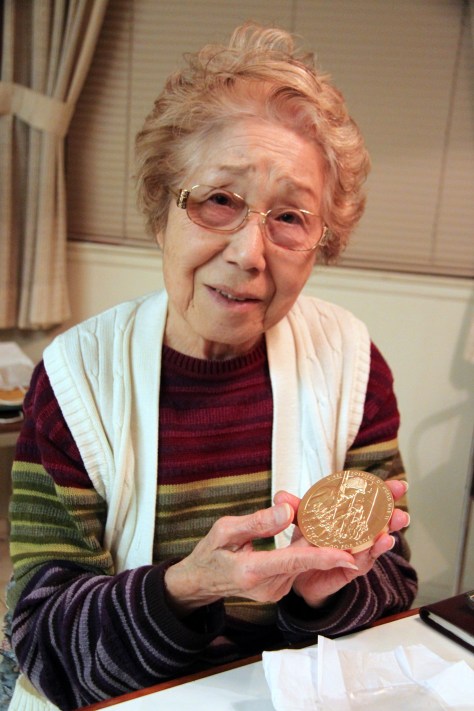There be gold in my family. Really. Well, the Congressional Gold Medal, that is. And it is made out of gold and honors the “Nisei Soldiers of World War II”. Its on display at the Smithsonian.
In fact, my family was awarded two of them. Two Congressional Gold Medals. Pretty neat, don’t you think? Three if you include a distant relative. Four if Dad had enlisted in the Army five weeks earlier. OK. Enough of that.


________________________
It was just a miracle mom and her younger sister Eiko survived the war having lived in the heart of Tokyo where very little was left standing. My grandmother was required to train with a sharpened bamboo spear to repel the invaders that were expected to come. It’s true.
But when war ended in 1945, neither my mother nor my Aunt Eiko could have possibly thought that they – through no grand scheme – would each end up marrying an “invader” and that they would end up living in America. The country that bombed their home into ashes. But it was a brutal war. Just fact.
Even more stunning is that they would be unknowingly dovetailed with the famed US 8th Army’s Military Intelligence Service (MIS) for the rest of their lives. (I had briefly reported on the top secret MIS in an earlier short story.)
________________________

The first family member bestowed the Congressional Gold Medal is my mother and Aunt Eiko’s cousin, Taro Tanji; he is pictured above in a family portrait taken in Tokyo. He was born in Merced County, CA. Taro, like my father, was imprisoned in the camp called Granada in Colorado for being of Japanese heritage although he didn’t speak one word of Japanese.
In 1944, along with thousands of other young American boys of Japanese heritage, he was drafted out of the camp into the US Army. He was a “Nisei”. He then was assigned to the top secret US Army Military Intelligence Service Language School (MISLS) in Fort Snelling, Minnesota to learn the Japanese language.
After graduating, he was assigned to Tokyo as part of US 8th Army and became part of the Allied Occupation. Once there, he immediately sought the fate of my mother’s family.
Through the resources of the MIS, he miraculously located my grandmother – the same one who was forced to train with a bamboo spear. They had survived but were in dire straits like millions of other survivors.
Exactly as my father did for my cousin Masako in Hiroshima, Taro used whatever pay he had to buy them clothing and essentials from the PX, took them C-rations and of course, American cigarettes for my grandfather. There are many stories of other things Taro did (he was a STRONG man) which I will save for later.

A kind man, Taro became a much loved teacher in the Gardena school system. He recently passed away in Gardena, CA in 2009.
His CGM was posthumously awarded to his wife, Aunt Martha. Amazingly, neither mom nor Aunt Eiko realized Taro was part of the MIS until I told them. I determined that through research of US Army records.
______________________
My Aunt Eiko was sickly as a young girl. Indeed, it was a miracle especially for her to have survived. She hates medicine, even to this day. As a funny story, when the US Army began de-licing the surviving Japanese citizens, she ran away as she was terrified she would get sick from the powder. Well, it was DDT so she wasn’t that far off.
In 1966, she met Paul Sakuma, a Hawaiian born Nisei. While Uncle Paul told Aunt Eiko he was also put into camp on the Mainland (the article says that, too), I can find no record of his internment. However, Uncle Paul was at some time in Springfield, Massachusetts after the war started. He was “featured” in this newspaper article. Surely, the title of the article was a sign of the times.

Uncle Paul was also drafted in 1944 and was also sent to the MISLS at Fort Snelling, Minnesota. This is the only photo Aunt Eiko has of Uncle Paul in uniform. I stumbled across it last year. Frankly, Aunt Eiko also knew very little of his Army days but I noticed the building in the background (below) as being the old cavalry barracks at Fort Snelling which sparked my researching again. He was also indeed a member of the famed MIS unbeknownst to Aunt Eiko.

Uncle Paul was also immediately dispatched to Tokyo as part of the Occupation Force. He was assigned to the 720th Military Police Battalion and accompanied patrols where his translation abilities were needed. A couple of good patrol stories – ones that men would likely appreciate. Perhaps some ladies, too. No harm, no foul, as the great Chick Hearn said.
Days before my first marriage, I got a call from Aunt Eiko late at night. She was hysterical. Uncle Paul had died of a massive heart attack in 1980 in Tokyo in the new home he had just finished building for them. He had continued living in Tokyo as a civilian employee of the USAF.
Like Taro, Uncle Paul was posthumously awarded the CGM. I secured the CGM and surprised her with it. Aunt Eiko “cried for happy” as he held the medal for the first time early this year (below). She loves him greatly to this day. She said, “Even today, Paul brings me great happiness.” If that doesn’t bring a tear to your eyes, well, you’re pretty tough.

_______________________
As dad volunteered in February 1947, he did not qualify for the CGM. But unbelievably, mom, too, did not know much of what dad did in the Army let alone him being a member of the MIS. Mom said dad never talked much about it except to say he did not enjoy interrogating Japanese soldiers being returned from Russia and Manchuria.
Nevertheless, mom and Aunt Eiko WERE enmeshed with the famed Military Intelligence Service although they didn’t realize it. Fate. They were surrounded by the invaders – secretly. Famous ones at that. A prejudiced opinion, of course.
_______________________
I am very proud of these Americans. The Congressional Gold Medal is a tremendous honor and finally brings to public light the importance of the intelligence they secretly obtained for our United States of America amidst prejudice and discrimination.
I like to think that these Americans of Japanese heritage weathered the clouds of that time so we could have glorious sunshine today.

What a really lovely story. You are right to be proud of your family. We do look forward to more!
Thank you for reading the story from afar. I love the photos of the pooches!
Thank you for sharing your family’s honor. I thank you, for their service.
Thank you, Chatter Master. I’m sure the folks in your neighborhood – even the one who called you “Honey” – is grateful for YOUR service.
🙂 well…..maybe not THAT one.
LOL!
I’m proud of them, too, and you.
I’m also sickened by what they had to endure.
Much appreciated, seapunk2, but the intent is other than to sicken you. It happened. But while they received the nation’s gratitude nearly 70 years to the month, all these aging veterans wish one thing: that this does not happen again. I believe that is their message.
I understand that. I hurt inside, sometimes, for the way people have conducted themselves and today, still do so.
Thank you and your kind soul…
I have learned so much from your blog, it is very interesting and puts a personal touch on history. So little is said of the Japanese Americans and of their sacrifice both in the military and the home front. You have a strong heritage. Blessings – Patty
If a few more people learn of what “silent” Americans did but secretly for the red, white and blue, then its mission accomplished. Thank you dropping by. 🙂
Nice post!
Thanks for this morning!
Awesome post. Awesome history. Thanks for sharing it.
Sir, you have a greater history! 🙂
That I doubt. Everyone has a history, and in that history you will find people overcoming challenges, braving odds, going the extra mile – being defeated, dreams lost, dreams gained – the whole of the human condition echoes through history’s annuals if we only take the time to learn their tales. And there are plenty of them – more are discovered each day through archeological research, and the writings and research such as yours which put a human face – and a human tale – to huge historical events; the sacrifices our ancestors made.
One of the Internet’s blessings is that the more we read, the more we realize “we are like them.” All over, no matter where you go, with only a few notable exceptions.
I don’ t recall any medals being won by anyone in my family, though I have a meritorious mast and a field promotion by a general stuck in a folder somewhere, LOL! And with a brother who was almost declared a deserter . . . Go figure. He got a dishonorable discharge; I was a shining wonder. You’d never have known it from the beginning; he was the military kid and I was the rebellious hippy child as a teen, LOL.
Go figure. He got a dishonorable discharge; I was a shining wonder. You’d never have known it from the beginning; he was the military kid and I was the rebellious hippy child as a teen, LOL.
Give your father my congratulations on raising a good son, by the way. Tell him “Job well done!”. Too well done to have been done by a pumpkin head – no matter what he says about himself! An honorable man, no doubt – as are you, by honoring him with your records of his memories and your findings here for people like me to read and see – and be humbled by what he overcame. A strong man, no doubt.
Sir, you are too kind… but according to old man Jack and Mr. Johnson (who was decorated himself), they’d trade their medals and commendations for one more soul that could have come back home… As for your brother, he served whereas I didn’t. That says a ton.
Your words an thoughts are truly honorable as was your family’s service…
Thank you for sharing this! I’m from Cody, Wyoming originally and there was a huge internment camp there. Hart mountain internment camp if I’m not mistaken. The hope is that something like this doesn’t happen again. Thank you for your families service!
Thank you for reading! As they dwindle in number each day (in tandem with WWII veterans and Rosie the Riveters), they continue to bring this chapter of history to the forefront. As you kindly stated, the hope is something like that does not happen again.
The “internment camp” you mention is indeed Heart Mountain, Wyoming. Currently, it is one of the better preserved sites although rarely visited. It’s a somewhat buried part of history. Here is an overview website if you are at all curious.
http://www.heartmountain.org/
Thank you again for the visit.
An amazing family story. So much family on both sides of the war, and to have three CGMs in one family, impressive. Each story you tell teaches me more about the war than I ever could have learned in school. I suppose you’ve been told that you should write a book or maybe you already are. I’m sure you’d have a huge response.
Thank you, appletonavenue, once again. You are too kind…but alas, a writer I am not… 🙂
AMAZING story, you should write a book, seriously. These stories are a treasure–coming from someone who hates history subject when I was in college 🙂
Writing a book is for a writer! But thank you so much for your kind thoughts and comment… and history is what makes us. Perhaps you can write about food history to get you interested! 🙂
Perhaps 🙂
Internment has always been a subject of interest to me since I grew up in a community in which there were Japanese who I understood were not interned during World War II. This has always puzzled me. Was internment geographically based and mostly limited to the West Coast?
Also, I have learned recently that Japanese in Canada were also interned during World War II, but that is rarely mentioned. Why is that?
Last question first… My first mother-in-law (a Japanese-Canadian) was sent to live in a Canadian camp; however, I do not know which one. As to why it is rarely mentioned, who knows? Maybe because their political/cultural structure does not highlight spotlight racial issues? Maybe there just weren’t as many as there was here. After all, it was Pearl that was bombed.
Yes, there was “some” notice the imprisonment was going to happen… If a family could muster enough money AND have someone take care of their possessions or home, they could move eastwards. Folks like my dad’s stateside family did not have the wherewithal so they were rounded up and sent to the camps. When dad ended up in Minidoka, the government allowed inmates to work OUTSIDE of the barbed wire and/or move out eastward at their own risk. Also, if a family was not imprisoned, they would not have had to endure the famous “yes/yes” questionnaire.
As I feel FDR orchestrated America’s being brought into war, they had plenty of time to think about what to do with perhaps the espionage that was taking place (no implying of large or small but it was occurring). How could FDR remove the alleged Japanese spies and NOT alert Japan to the fact the US had broken their Purple code and JN-25? Therefore, FDR signed EO 9066. Move them ALL away from the west coast.
Was there an zone east of the West Coast where Japanese were not subject to internment? Was simply identified as being so many miles from the coast or was it delineated by state?
Hello, sir. I’m out and about now but a quick link. Hope it works! http://2.bp.blogspot.com/-2ib7f3Da5To/TV_azi8Gb6I/AAAAAAAAA9Y/nKzrzIzfx_E/s1600/File%253AMap%2Bof%2BWorld%2BWar%2BII%2BJapanese%2BAmerican%2Binternment%2Bcamps.png
Thanks for the link, Koji. As with many things, a simple graphic quickly answers a lot of questions. I have an idea that a similar geographic exclusion zone existed in Canada. In later years, what sort of feelings existed between those Japanese who were in the exclusion zone and interned and those not in the exclusion zone who were not interned?
Long story made short…
First of all, at the formation of the 442nd RCT, the Japanese-Americans from Hawaii were very unhappy at the Mainland Japanese-Americans like my dad. This was because not many Niseis in the camps were gung-ho about enlisting. The Hawaiian J/A’s were then taken to these camps to see first hand. The barbed wire, Browning machine guns, the barracks. They then understood why not many Mainland J/A’s joined. But that quickly changed.
Within the camps, there WAS strife. The Issei’s (first generation) were relatively opposed to their sons joining the US Army. Then within their sons, there was again strife. Some J/A sons were adamantly opposed to joining, i.e., “Why should I fight and die when FDR put us into these god-forsaken camps?”
Then to make matters worse, the infamous “no/no” questionnaire came up. Those that answer “no” were sent to Tule Lake.
When a family or portion thereof sought to leave the camps to try living amongst “Americans” (even though they themselves were American), only parental protective instinct held them back but they left. They left with the blessings of their fellow inmates. Unless the family had money being watched over by Caucasian neighbors, a family would not be able to leave as they had only one suitcase of belongings. No cars, radios, cameras or knives and the like were allowed in camp.
As to those in Chicago, let’s say, at the outbreak of war, they had to endure the hatred but many of their loyal Caucasian friends protected them in spite of the possibility of being labeled a “Jap lover”. Otherwise, the concentrations of Japanese were indeed in the western United States although the exact number living away from the West Coast eludes me.
There is a large collection of books and DVD’s on this matter: http://janmstore.org/collections/books-media
For some reason, my computer doesn’t want to let me “like” this post- but I did! Thank you so much for sharing your family’s history. I’m glad that they were recognized after all of this time for their service 🙂
It’s funny seeing the pictures of Ft. Snelling- it’s quite near my childhood home, but I’ve never visited it. I hear the museums are good though… I’ll have to try to make a visit happen!